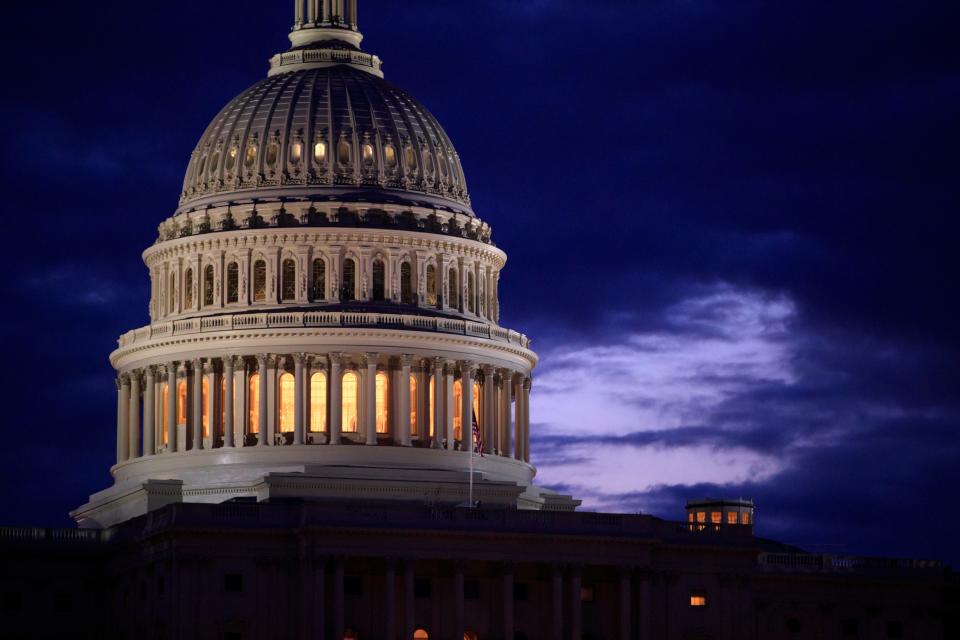'Three-martini lunch' tax break, foreign aid: Year-end bills stir controversy
WASHINGTON – The $2.3 trillion spending package Congress overwhelmingly passed last week has a little bit of everything.
Fused from two major bills – a $900 billion coronavirus aid package to address the economic fallout of the pandemic and a $1.4 trillion spending measure to fund the government through Sept. 30 – the legislation includes money for direct payments to millions of families, vaccine distribution efforts and pay raises for the military.
It also includes controversial provisions that would extend tax breaks for race car tracks and business lunches, millions for venues that aren't open and a requirement that carbon monoxide detectors be installed in public housing apartments. It includes billions in foreign aid, which often draws conservatives' ire, and money for President Donald Trump's border wall, which enrages liberals.

Trump signaled he may veto the bill, saying some provisions, such as foreign aid and money for cultural institutions, have no place in a bill aimed at helping the country weather the coronavirus pandemic that has killed more than 332,000 and shuttered thousands of businesses.
In a video he tweeted Tuesday night, Trump called the bill a "disgrace" for not providing enough in direct payments to Americans and for spending too much on foreign aid (though the budget he submitted to Congress this year calls for roughly the same funding levels).
More: $2,000 checks in limbo as Congress unable to agree on COVID-19 relief payments
Many of the tax breaks and controversial provisions are included in the $1.4 trillion spending bill attached to the relief bill. Government watchdog groups said that doesn't excuse what Congress approved.
It is "a sweetheart deal for defense contractors, guarantees high levels of farm subsidies deep into 2021 and (tacks) on dozens of other special-interest provisions that won’t be found until days or weeks after the lawmakers have left the Capitol," said Steve Ellis, president of Taxpayers for Common Sense, a nonpartisan watchdog group that tracks government spending.
'You could lose parts of the economy': Fed and Treasury urge Congress to approve more virus relief
Here are some of the most controversial sections of the second-largest relief package in U.S. history.
Foreign aid programs
In his surprise late-night speech denouncing the package Congress passed, Trump decried billions in funding for programs in foreign countries.
All of the funding proposals the president complained about were equal to or slightly less than the allotments in the budget Trump proposed during negotiations.
More: Trump leaves Congress with holiday cliffhanger on COVID-19 bill as lawmakers scramble
Some of the entries include $505 million in aid to Central American countries; $25 million for gender equity and democracy promotion programs in Pakistan; $1.3 billion in military aid to Egypt; and $219.5 million in aid to Southeast Asian nations.
Expanded military budget, defense contractor deals
The negotiated omnibus bill includes increases in military spending and contracts through 2021.
Lawmakers approved $696 billion in military appropriations, including $23.3 billion to build 10 warships and $9.6 billion for 96 F-35 fighters. Liberal Democrats opposed the budget increases, arguing for provisions that would “reduce Pentagon spending to prevent waste, fraud and abuse while maintaining support for personnel and families.”

The White House initially opposed parts of the military spending bill, arguing they enabled military conflicts overseas.
'Three-martini lunch' deductions
Democrats objected to a provision that would allow businesses to deduct two full years worth of business meals when filing taxes, deriding the measure as “three-martini lunches” for the rich.
Georgia runoffs: President-elect Biden campaigns for Democratic candidates in high-stakes Georgia Senate runoffs
The tax code allows half of those costs to be deducted. The cost of the new benefit, which the White House argued would help restaurants hurt by the pandemic, is projected at $6 billion in tax breaks for corporations over the next decade.
Keeping live venues afloat
About $15 billion of aid is designated for performing arts centers, independent movie theaters and other cultural institutions hit particularly hard by the imposition of social distancing measures designed to limit the spread of the virus.
The Save Our Stages act is aimed at helping only venues that have closed or are at risk of shutting down.
Supporters of the bipartisan effort said the grants would provide financial support necessary to keep venues afloat, pay employees and preserve a critical economic sector for communities across America.
Aid to cultural institutions
More than $40 million was approved for the John F. Kennedy Center for the Performing Arts, the Washington cultural jewel, many of whose trustees are appointed by the president.
The money includes $26 million for operations, maintenance and security, plus $14 million for improvements.
The Kennedy Center is often on lists of questionable spending, but it isn't the only cultural organization that would get assistance in the package. Also receiving taxpayer funds would be the U.S. Holocaust Memorial Museum ($61.4 million), the National Endowment for the Arts ($167.5 million) and the Smithsonian Institution (more than $1 billion).
More: Republican senators slowly begin to accept Biden as president-elect after Electoral College vote
Money was also directed to the National Endowment for the Humanities as part of the government funding deal. Trump objected to the measure.
Money for the border wall
The spending bill includes funds to fulfill one of Trump's most prominent campaign promises: construction of a partition on the U.S-Mexican border.
The $1.375 billion for the border wall is not as much as the nearly $2 billion Trump wanted, but it's more than his critics want taxpayers to cover. Inclusion of the money undercuts his campaign pledge that Mexico would pay for the structure.
A fight with Congress over border wall funding in December 2018 led to a 35-day shutdown of the government. There's no indication that a lack of wall funding this time is among the reasons Trump may veto the bill.
A 'NASCAR tax break'
The package would extend a tax benefit for racetrack owners.

Under the "NASCAR tax break," owners could get a windfall of up to $224 million over 10 years to write off construction and renovation costs.
Establishment of Women's and Latino history Smithsonian museums
Legislation tied to the government funding bill approved the creation of Smithsonian museums for Latino and women's history. Like all Smithsonian programs, the museums would be funded by splitting private donations and public money.
Sen. Mike Lee, R-Utah, opposed the move.
More: Donald Trump demands bigger checks in $900 billion COVID-19 relief package passed by Congress
“The last thing we need is to further divide an already divided nation within an array of separate but equal museums of hyphenated identity groups," he said this month.
Tax breaks for the liquor industry
The liquor industry was a big winner in the bill, which would permanently secure billions in tax breaks even though studies show alcohol consumption has risen sharply during the pandemic.
Among the measures is a cut in the excise tax for beer, which would probably incur a 10-year cost of $1 billion; an excise tax break for domestic wine producers worth $2.2 billion; and a tax break for makers of distilled spirits valued at $5.7 billion.
Presidential transition expenses
The package includes $9.9 million set aside for the expenses of the presidential transition. That funding would help President-elect Joe Biden's administration assume office in the coming year. The bill includes at least $8 million meant for the Trump administration to aid in the process.
More: See how tax brackets affect your income tax rate in surprising ways
Trump would essentially fund the exit from office he's fought through the courts and Congress by challenging the election results.
Postal Service funding
The aid package includes a provision that would convert a $10 billion loan to the U.S. Postal Service into direct aid. The funds would be used to support logistics and supply workers with personal protective equipment and other necessary aid.
Christmas shipping delays: Target, Postal Service, others warn of high volume nationwide amid COVID-19
The bill would preserve six-day postal delivery and prevent the consolidation or closure of rural and other small post offices, measures which the president has opposed.
This article originally appeared on USA TODAY: COVID-19 aid package includes business lunch tax breaks, foreign aid

